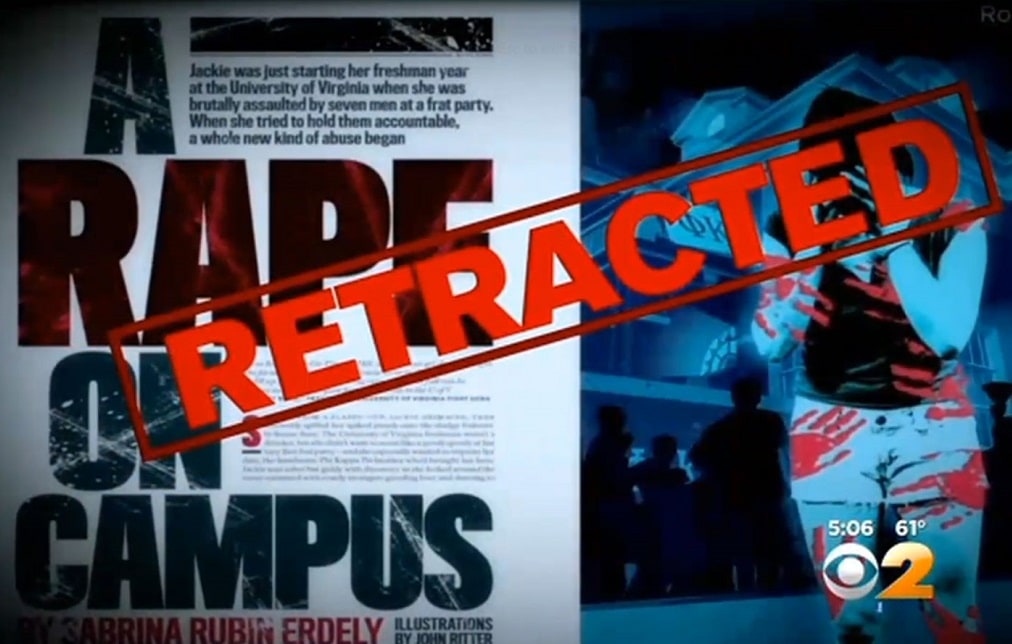Many luminaries have urged us to believe whatever a woman says about her experience in sexual encounters. This view is widely held by feminists, the #metoo advocates, the Obama Department of Education, and many university administrators and bureaucrats, especially the university “equity, inclusion, and diversity” officers.
Should we believe whatever a woman says? Perhaps we should start with a complementary question: Should we believe whatever a man says? Or, more specifically, should we believe whatever a man says about his sexual experiences? Both men and women belong to the same species, homo sapiens sapiens. This is Latin for “wise man.” But do we think that the “wise man” should always be believed?
It is commonplace for TV detectives and doctors to say that “everyone lies.” The New York Times bestseller, and Economist Book of the Year for 2017, entitled Everyone Lies, argues that “Everybody lies, to friends, lovers, doctors, pollsters and to themselves.”
I think that most people would agree that men’s stories of sexual conquest have to be taken with a grain of salt. In fact, the more someone speaks about his conquests, the less confidence we should have in their reality. I have over the years heard stories about sexual conquests and did not believe them.
It is not a great leap to be skeptical of anything a salesman tells you. After all, salesmen are all about selling. Sometimes their income depends upon how much they sell. Even keeping their job depends upon how much they sell. So, the motivation to sell is very strong, and as is the temptation to exaggerate or massage the truth about the product.
Consider investment advisors, who are also really salesmen. They claim to be working for the investor, but in fact, are working for themselves. The worst are mutual fund salesmen, who take an extortionate cut of your money, whether or not your investments are successful. Stock salesmen commonly charge a percentage of your capital, whether or not their advice is any good and whether or not your earnings beat the market. The investment industry has vigorously opposed laws that require advisors to take fiduciary responsibility for their clients. The entire industry is a racket based on clients’ fears about managing their own money.
Children often lie to their parents, about their school experiences, about studying, about drinking, about dope, and about sexual experiences. My son certainly told me whoppers, such as the empty gas tank of my car was not a result of his stealing the keys and driving around all night, but draining the tank so that he could fuel a burn off of some brush in the woods.
In pursuit of their individual interests would women, as do men, try to manipulate and influence their environment and other people to satisfy their needs? Do women in all and every circumstance tell the truth? In fact, everyone knows that both male and female individuals will sometimes lie to protect their egos, to gain access to resources, to improve their status and prestige, to protect their families, to advance their careers, and to support the social causes that they think important.
Do female saleswomen, lawyers, politicians sometimes lie? Would that shock you? Democratic Presidential nominee Hillary Clinton claimed that all of those voters supporting her opponent were sexists, racists, homophobes, and Islamophobes, “a basket of deplorables.” Even she had to climb down from that howler, saying that only half of her opponent’s supporters fell into those categories. A less inclusive lie.
Now, the injunction to believe women is made specifically in regard to accusations of sexual assault. The argument is that, as there are proven cases of sexual harassment, assault, and rape, and as these are crimes that no one should suffer, if a woman claims that she has suffered from one of these, we should not make her suffer more by doubting her. Thus in most universities, including my beloved McGill University, a female making an accusation is officially labeled a “survivor.”
Today, a female claiming that she was sexually assaulted is deemed, on the basis of the claim alone, to be telling the truth. The reasoning is, why would a woman lie about a nasty, embarrassing, shame-inducing experience. She has nothing to gain and everything to lose. So, she must be telling the truth.
This is a remarkable new standard of “justice.” The basic human right of equality before the law is rejected. Men and women are supposed to be treated equally, not differently treated with women believed and men not believed. The presumption of innocence is rejected; on the contrary, with female accusations against males, the male is presumed guilty. Due process is rejected, with no opportunity for defense or cross-examination. The need for corroborating evidence is rejected; a woman’s accusation is accepted as proof of a man’s guilt. All of the common-law jurisprudence is thrown out the window.
It is difficult to sustain the argument that women would never lie about sexual assault given the many cases in which women have been judged to make false allegations.
Case one: Three Duke University lacrosse players who had hired a stripper for a party were accused by the stripper of rape. In spite of vigorous and illegal prosecution, the court concluded that there was no evidence to support the claim of rape. The State Prosecutor who prosecuted this case withheld exculpatory evidence and was eventually disbarred and jailed.
Case two: A University of Virginia student claimed to have been gang-raped at a fraternity party. She sold her story to Rolling Stone Magazine. An investigation by Columbia School of Journalism concluded that journalistic standards had been violated, as the word of the claimant had been accepted as truth, without even speaking to the accused or the alleged witnesses. There was no supporting evidence, the accuser’s story changed over time, and no witnesses were ever produced. Rolling Stone was sued by the fraternity, which was named in the article, and settled by giving the fraternity $1.65 million. A female University administrator, named in the story, was awarded three million dollars by a Federal Jury for false and defamatory statements.
Prevarication for Credit
Case three: “Mattress Girl,” a Columbia University student who claimed that she had been raped by a friend, spent the rest of her time at Columbia carrying a mattress to represent the wrong she had suffered. Both the University and the police investigations concluded that the accused student had not raped the accuser. The email evidence showed that, after a casual, consensual sexual relationship, the accuser wanted to take the relationship to the next level, but the accused did not. Even though the accused was exonerated, the accuser was allowed by the University to carry the mattress around, and even accepted that carrying it around was her senior project, for which she received credit! Then the University allowed her to carry to the mattress to her graduation ceremony. The exonerated accused student sued the University, and eventually, the University settled for an undisclosed amount. The accuser is now a professional feminist performance artist. NOWToronto refers to her as a “rape survivor.” The National Organization of Women gave mattress girl the 2016 “Woman of Courage” award.
Case four: An award-winning novelist, a Professor at the University of British Columbia, was accused of rape by an older woman with whom he had a consensual affair four years earlier. The University appointed a retired female Provincial Supreme Court judge to investigate. She could not find evidence that any of the claimed events happened, and awarded the accused $167,000. The University fired him anyway.
Case five: A woman accused an Army Colonel of having raped her thirty years before when they were cadets at West Point. The woman said that she had been inspired to speak about her experience after seeing high profile cases of rape in the military. The accused denied that this had happened. With these allegations receiving publicity the Coronel was refused a promotion. He sued for defamation and won. The jury directed the accuser to pay to the accused $3.4 million in compensatory damages for injury to the accused’s reputation and lost wages, and $5 million in punitive damages, as deterrence against future false claims.
Case six: A female student at Sacred Heart University took a fancy at a football team party to two football players, and had consensual sex with them in a bathroom. Later, she claimed that the football players had forced themselves on her, in spite of her resistance, and raped her. Eventually, however, according to the arrest warrant affidavit, “She admitted that she made up the allegation of sexual assault against (the football players) because it was the first thing that came to mind and she didn’t want to lose (another male student) as a friend and potential boyfriend. She stated that she believed when (the other male student) heard the allegation it would make him angry and sympathetic to her.” In a Superior Court case, she pled guilty to two counts of false reporting and one count of interfering with police. She was sentenced to three years in jail, suspending after one year, followed by probation.
In none of these, and many other cases, was any concern shown for the accused. They were already guilty of being male, and it was assumed that they were likely to have engaged in a brutal violation of a helpless female. The idea that a person accused of rape might be innocent is dismissed in universities and the social media, and in feminist ideology. Only in courts is there a semblance of due process, the assumption of innocence, and a demand for evidence.
Why should there be concern for the accused? There are two reasons. First, truth should count for something. “Everyone has their own truth” is just not good enough for resolving conflicts. Second, the lives of the accused are brutally disrupted, and it is doubtful that their reputations ever recover.
Here is the testimony in court by the innocent accused in Case six:
Accused number one said, “I went from being a college student to sitting at home being expelled, with no way to clear my name. I just hope she knows what she has done to me. My life will never be the same. I did nothing wrong, but everything has been altered because of this.”
Accused number two said, “She accused me of what I believe to be a horrendous, horrific crime out of her own selfish concerns. I lost my scholarship, my dream of continuing to play football, and now I am in debt $30,000, and I’m simply trying to get ahead as best as I can.”
Similar statements have been made by the innocent accused in Case one, the Duke lacrosse players, and by many other innocent accused.
Some feminists take the view that men have oppressed, exploited, and brutalized women for tens of thousands of years, and so whatever men suffer now is well deserved. Feminists also advance the false view that we live in a culture that encourages rape and the brutalization of women. Some feminists now argue that regret about a consensual sexual encounter shows that it was in fact rape.
In fact, we do not live in a “rape culture”; in our society rape is viewed as a heinous crime, and the penalties for it are severe. Many men, I would say most men, share the impulse to protect women, to protect their mothers, sisters, girlfriends or wives, and daughters, and all other vulnerable women against violence, including rape. That is why it is rare for men to come to the support of those accused of rape, while most females tend to unite in support of anyone who cries “rape.”
Like most men, I view rape as a heinous crime and believe that each individual, male or female, should not be forced to engage in sex against their will. But I reject the illiberal reducing of people to gender categories and judging them on that basis. True justice requires that individuals be treated according to their individual just desserts. Accusations of malfeasance and brutality must be examined carefully, but with the utmost reserve, dispassionately. Any accuser might be self-deceiving, callous, ruthless, and dishonest. It is the duty of investigators not to side with some category of people but to seek the truth in every single individual case.
Anyone who says “believe whatever a woman says” or #BelieveSurvivors is either a fool or a feminist fanatic.



